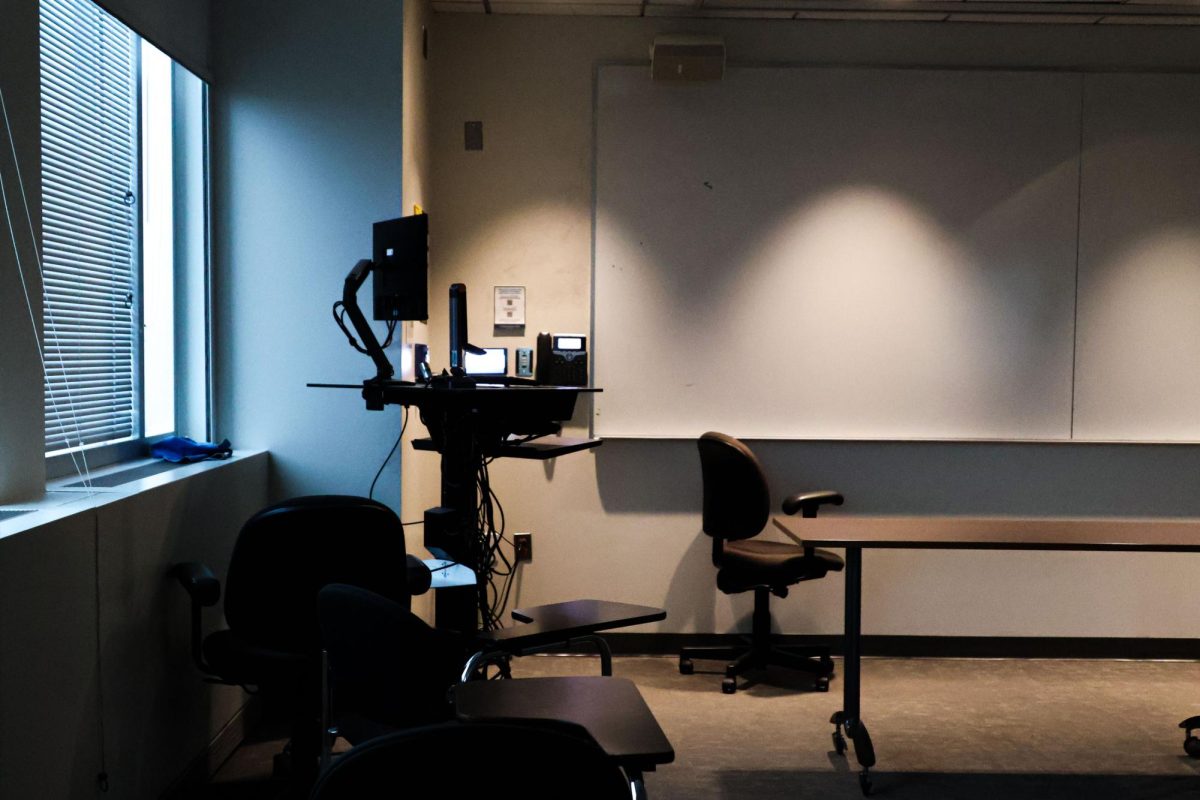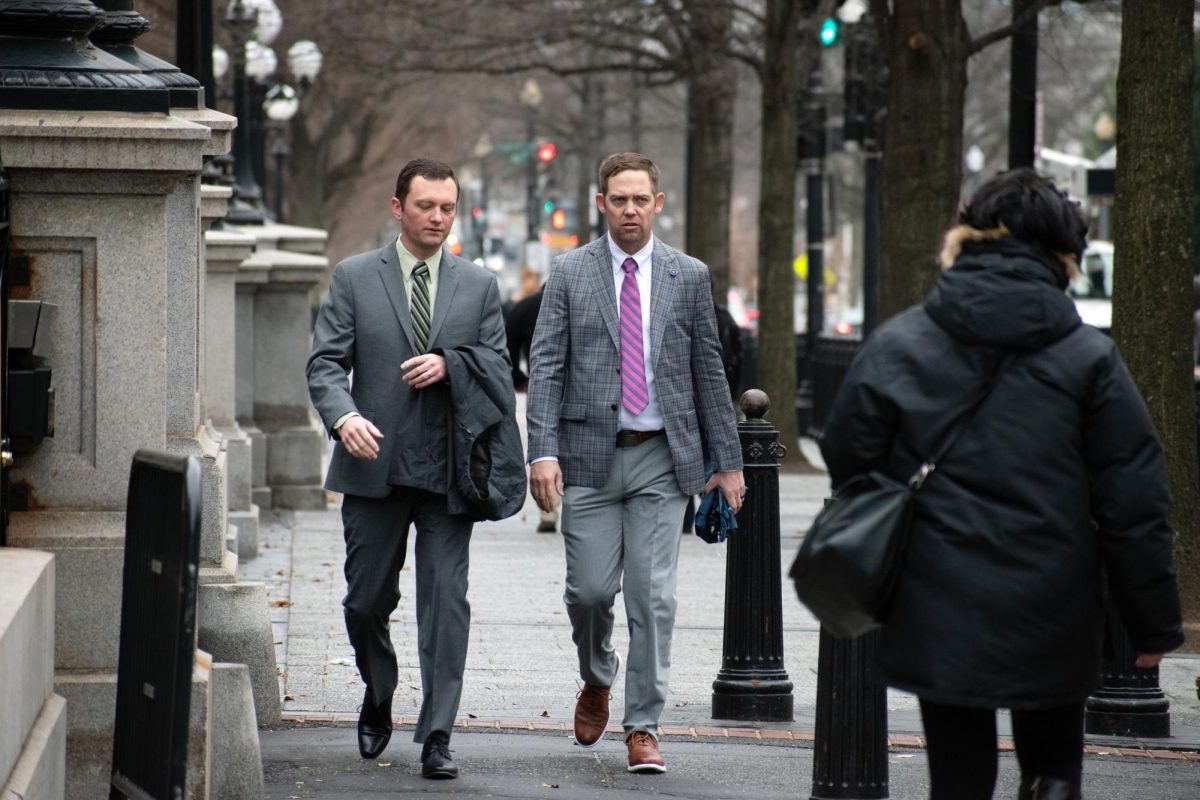This post was written by Alli Hoff and Andrew Nacin.
The Student Court ruled on Tuesday to uphold the Joint Election Committee’s decision to disqualify presidential candidate Kyle Boyer from the Student Association runoff election.
In a 2-1 decision, the Court found that the Joint Elections Committee did not “abuse its discretion” in disqualifying Boyer, a junior. Senior Brand Kroeger said he was the dissenting vote, voting in favor of Boyer.
The runoff will take place Wednesday and Thursday between sophomores Julie Bindelglass and Nick Polk.
“While the members of this Court disagree with the analysis of the JEC, and perhaps even the outcome, they recognize the deference due to the JEC and cannot find an instance of abuse of discretion,” wrote Chief Judge Chris Wimbush. The Court has 30 days to publish majority and dissenting opinions.
Boyer did not respond to requests for comment but posted a message to his friends on Twitter.
“I mean everything happens for a reason, I could quote a scripture but you already know that God is awesome,” Boyer wrote on Tuesday night. “And no, I’m not voting tomorrow.”
The violations levied against Boyer concerned his compliance with the JEC’s standards for reporting campaign finances. According to the JEC, Boyer should have claimed the fair market value of a car he used to display posters on H Street during the general election two weeks ago. The car was borrowed for the campaign from Boyer’s friend Dave Fowler, and therefore had no specific attached cost. The JEC said that the fair market cost of the 1997 Jeep Cherokee could be compared to the rental cost of a mid-sized SUV.
Boyer, the SA’s executive vice president, contended in court that Fowler’s car was in poor condition and would not be available to rent on the market, thus no fair market value exists for the car. Boyer added that even if the JEC determined that Boyer had to report the fair market value of the car, the vehicle should have been reflected in a lesser price estimation than the JEC’s $206 estimation.
Judge Brand Kroeger, last year’s SA executive vice president, asked Boyer if there was “even a market to rent a car” like Fowler’s. Boyer said there was not.
Judge Derek Jamison, a law student, asked why a mid-sized SUV was used to compute the fair market value. “Wouldn’t a van or a cardboard box suffice?” he asked, noting that the car was used for storage.
“Would you rent Fowler’s car for $206?” Jamison asked James Bonneau, the JEC’s investigator. JEC member Joe Buono said the problem is other candidates would have needed to spend $206 to rent a car similar to Fowler’s.
Regardless of the vehicle’s fair market value, Boyer argued that it did not need to be reported to the JEC because the car itself was not intended for campaign purposes. According to his interpretation of JEC campaign rules, only items purchased specifically to promote a candidate warranted mention on campaign finance forms. Although the posters displayed on the Jeep did promote his candidacy, Boyer claimed the car itself did not, rendering the complaint moot.
“The purchase of the car by Mr. Fowler was completely independent of anything that happened at GW or with this election,” Boyer told the court. “The car was purchased before he came to GW and before he even knew Kyle Boyer.”
Boyer compared his campaign’s use of the car for display purposes to Executive Vice President-elect Jason Lifton’s use of his fraternity house for postering. The JEC argued that the Sigma Chi house is private property, while the street on which Boyer stationed the car is public ground. Boyer, the committee claimed, exploited H Street as extra postering space outside of that allotted by the JEC.
“What’s the difference between a privately owned house Lifton used and a car Boyer used?” Kroeger asked. “If you had to report a house,” he joked, “would that put you over the expenditure limit?”
Boyer argued that his campaign should not be penalized for accepting and utilizing a donated vehicle. He said that all candidates seek the most efficient options possible.
“An entity might give a candidate a discount,” he said. “Are we then to penalize that party because they asked for a better option? The fact that they asked for that better option penalizes them even though the other party could have asked for the same option? I don’t think they should be penalized, and that’s what setting this standard would do.”
The JEC argued that donations were clearly outlined in the rules as required expenditures, and therefore need to be reported by candidates.
“The fact of the matter is that Mr. Boyer used the SUV to promote his candidacy over those two days, even if it was donated by Mr. Fowler,” Bonneau said. “It just doesn’t make sense that Mr. Boyer is allowed to shortcut around the rules and borrow his friend’s car. That is capricious, to require that other candidates list their expenditure and excuse Mr. Boyer.”
The JEC’s second complaint against Boyer accused the candidate of failing to submit financial information about Facebook advertisements he had purchased. Boyer told the court that this was a “legitimately forgetful event” and that he attempted to correct his error in an e-mail to the JEC requesting a second opportunity to submit his financial forms. The e-mail, sent the evening of Feb. 28, was Boyer’s “good faith effort” to inform the committee of his full spending, which he said was far from the stipulated limit.
“I find that argument to be completely ridiculous,” Bonneau said. “Nowhere in the additional 2009 rules and nowhere in the JEC charter does it permit the JEC to extend deadlines for a single candidate. We explicitly stated when the deadline for reporting would be. Nowhere in the rules or charter is there an allowance, even for honest mistakes.”
Chief Judge Chris Wimbush, a senior, noted that the JEC reopened registration deadlines for positions that did not have enough candidates running.
Two judges, medical student Ricky Harika and senior Kevin Kozlowski, were not in attendance and took no part in the decision. Only three are required to hear a case and render a decision.
More than 50 students were on hand for the hearing, which was moved to the Marvin Center Ampitheatre when it was clear a fourth-floor room was too small.




